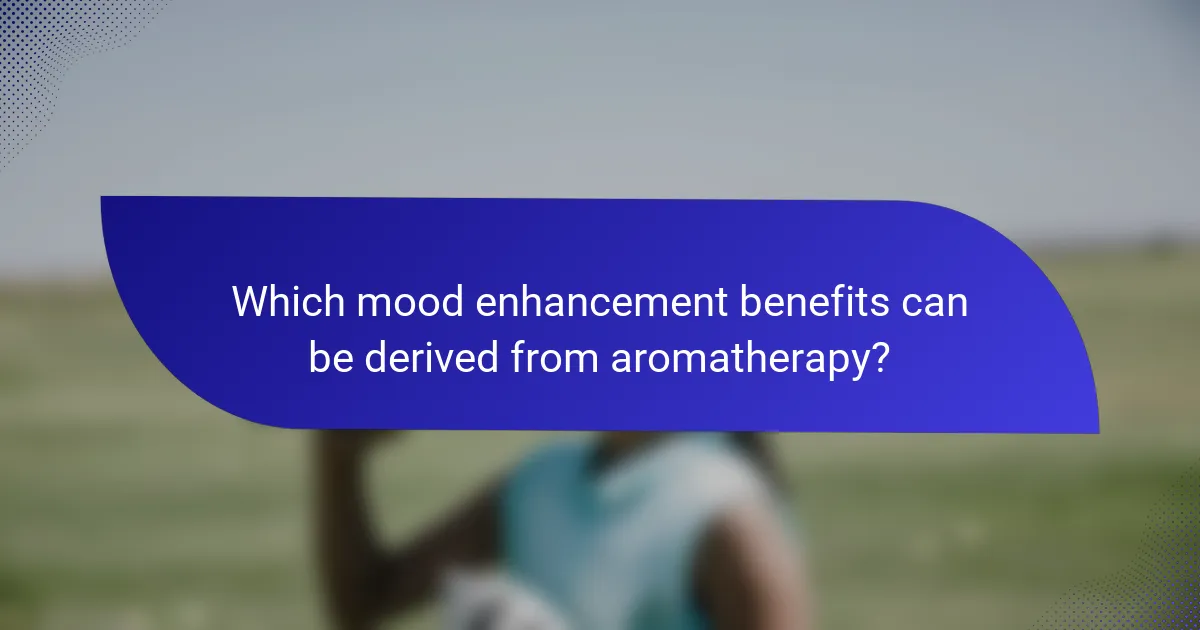Aromatherapy offers effective solutions for stress relief, mood enhancement, and relaxation. Essential oils like lavender and chamomile can reduce anxiety and improve emotional well-being. Various application methods, including inhalation and topical use, amplify these benefits. Cultural practices also shape unique aromatherapy experiences, while safety precautions ensure a positive outcome.

How does aromatherapy alleviate stress and promote relaxation?
Aromatherapy effectively alleviates stress and promotes relaxation through the use of essential oils. These oils, such as lavender and chamomile, have calming properties that can reduce anxiety and improve mood.
Inhalation of these scents activates the limbic system, which influences emotional responses. For example, lavender oil has been shown to lower cortisol levels, a hormone associated with stress.
Topical application of diluted essential oils can also provide relaxation benefits. Massaging these oils into the skin enhances physical relaxation and promotes a sense of well-being.
Using aromatherapy in a calm environment, such as during a bath or meditation, can further amplify its stress-relief effects. Incorporating aromatherapy into daily routines can lead to lasting improvements in mental health and emotional balance.
What essential oils are most effective for stress relief?
Lavender, chamomile, and bergamot are among the most effective essential oils for stress relief. These oils promote relaxation and mood enhancement through aromatherapy.
Lavender oil is known for its calming effects, often reducing anxiety and improving sleep quality. Chamomile oil offers soothing properties that help ease tension and promote emotional balance. Bergamot oil can elevate mood and reduce feelings of stress by uplifting the spirit.
In addition, other oils such as ylang-ylang and frankincense may also contribute to stress reduction, though they are less commonly highlighted. These essential oils can be used in diffusers, massage oils, or baths to enhance their effects.
How do different methods of application impact stress reduction?
Different methods of application significantly impact stress reduction in aromatherapy. Inhalation through diffusers or personal inhalers delivers immediate effects, promoting relaxation and mood enhancement. Topical application, such as massage with essential oils, offers localized relief and deeper emotional connections. Bathing with aromatic oils provides a holistic experience, combining physical relaxation with mental tranquility. Each method uniquely influences stress levels, allowing individuals to choose based on personal preference and desired outcomes.
What scientific studies support the effectiveness of aromatherapy for stress?
Scientific studies indicate that aromatherapy effectively reduces stress, enhances mood, and promotes relaxation. Research shows that essential oils like lavender and bergamot lower cortisol levels, which directly correlate with stress reduction. A study published in the Journal of Alternative and Complementary Medicine found that participants exposed to lavender oil reported significant decreases in anxiety and stress levels. Another research article in the International Journal of Nursing Studies demonstrated that aromatherapy interventions improved relaxation and overall well-being in patients undergoing surgery. These findings underscore aromatherapy’s potential as a complementary approach to stress management and emotional health.

Which mood enhancement benefits can be derived from aromatherapy?
Aromatherapy can significantly enhance mood by promoting relaxation and reducing stress. Essential oils like lavender, bergamot, and ylang-ylang are known for their mood-enhancing properties.
Lavender oil helps reduce anxiety and improve sleep quality, contributing to an overall uplifted mood. Bergamot oil can elevate mood and alleviate feelings of stress, making it a popular choice for aromatherapy. Ylang-ylang oil is often used to combat depression and promote feelings of joy.
Research indicates that inhaling these scents can trigger positive emotional responses, leading to improved mental well-being. Regular use of aromatherapy can create a calming environment, further enhancing mood and relaxation.
How do specific scents influence emotional well-being?
Aromatherapy effectively influences emotional well-being by using specific scents to reduce stress, enhance mood, and promote relaxation. Essential oils like lavender and chamomile are known for their calming properties. Research shows that inhaling these scents can lower cortisol levels, the stress hormone. Citrus scents, such as orange and lemon, have uplifting effects, improving mood and energy levels. Additionally, peppermint is often used to enhance focus and mental clarity. Each scent’s unique attributes contribute to its overall impact on emotional health.
What role does aromatherapy play in managing anxiety and depression?
Aromatherapy plays a significant role in managing anxiety and depression by promoting relaxation and enhancing mood. Essential oils like lavender and chamomile have calming properties that can reduce stress levels. Studies show that inhaling these scents can lower cortisol, the stress hormone, and improve overall emotional well-being. Aromatherapy can be applied through diffusers, topical applications, or baths, making it versatile for individual preferences. Regular use can lead to a more balanced emotional state, providing a natural complement to traditional mental health treatments.
How can aromatherapy be integrated into daily routines for mood enhancement?
Aromatherapy can enhance mood by incorporating essential oils into daily routines. Diffusing oils like lavender or bergamot during morning rituals boosts positivity. Applying oils topically after a shower can create a calming effect. Using scented candles while reading or meditating promotes relaxation. Lastly, adding a few drops of essential oil to bathwater provides a soothing experience.

What are the unique applications of aromatherapy in different cultures?
Aromatherapy is uniquely applied across cultures for stress relief, mood enhancement, and relaxation. In Japan, practitioners use essential oils like yuzu for calming effects. In India, Ayurvedic traditions incorporate oils such as sandalwood to promote mental clarity and tranquility. Native American cultures utilize sage and cedar for spiritual cleansing and emotional balance. In France, aromatherapy blends are often used in spas for relaxation and stress reduction. Each culture tailors aromatherapy practices to its unique beliefs and healing philosophies, enhancing the overall experience.
How is aromatherapy utilized in wellness practices around the world?
Aromatherapy is widely utilized in wellness practices globally for stress relief, mood enhancement, and relaxation. Essential oils, such as lavender and chamomile, are often employed for their calming effects.
In Japan, aromatherapy is integrated into traditional practices like Shinrin-yoku, or forest bathing, where natural scents promote mental well-being. In contrast, Western countries often use aromatherapy in spas and massage therapy to enhance relaxation and reduce anxiety.
Studies show that inhaling essential oils can lower cortisol levels, contributing to stress reduction. For instance, a study indicated that lavender oil reduced anxiety in participants by up to 30%.
Aromatherapy’s adaptability allows for various application methods, including diffusers, topical oils, and baths. This versatility makes it a valuable tool in holistic wellness approaches worldwide.
What cultural beliefs influence the choice of essential oils?
Cultural beliefs significantly influence essential oil choices in aromatherapy. Different cultures associate specific oils with unique benefits, guiding preferences for stress relief and mood enhancement. For example, lavender is favored in Western cultures for relaxation, while sandalwood is preferred in Eastern traditions for spiritual grounding. These beliefs shape how individuals select oils based on personal and cultural significance. Additionally, the perception of scents varies globally, affecting emotional responses and therapeutic applications.

Which safety considerations should be taken into account when using aromatherapy?
When using aromatherapy, consider safety precautions to prevent adverse effects. Essential oils can cause skin irritation or allergic reactions, so perform a patch test before use. Ensure proper dilution to avoid toxicity, particularly for sensitive individuals. Pregnant or nursing women should consult healthcare providers before use. Store oils away from children and pets to prevent accidental ingestion. Use caution with certain oils that may interact with medications or have contraindications for specific health conditions.
What are the potential side effects of essential oils?
Essential oils can cause side effects such as skin irritation, allergic reactions, and respiratory issues. These effects vary based on the oil type and individual sensitivity. For example, lavender oil may cause skin reactions in some users, while eucalyptus can irritate the respiratory system. Always conduct a patch test before use and consult a professional for guidance.
How can users ensure safe practices when using aromatherapy?
Users can ensure safe practices in aromatherapy by following specific guidelines. First, choose high-quality essential oils from reputable sources to avoid contaminants. Second, perform a patch test to check for allergic reactions before widespread use. Third, dilute essential oils with a carrier oil to prevent skin irritation. Fourth, avoid using certain oils during pregnancy or with specific medical conditions. Lastly, ensure proper ventilation when diffusing oils to prevent overwhelming scents. These practices enhance the benefits of aromatherapy while minimizing risks.

What are the best practices for creating a personalized aromatherapy experience?
To create a personalized aromatherapy experience, focus on individual preferences and specific needs. Start by selecting essential oils known for stress relief, mood enhancement, and relaxation, such as lavender, chamomile, and bergamot.
Consider the method of application; options include diffusing oils, topical application with carrier oils, or adding them to baths. Customizing the blend to match personal scent preferences enhances the experience.
Experiment with different combinations and concentrations to find the most effective mix. Maintaining a calming environment, such as soft lighting and soothing music, further enriches the aromatherapy experience.
Lastly, document the effects of each session to refine future applications, ensuring a tailored approach to wellness.
How can individuals select essential oils based on personal preferences?
Individuals can select essential oils by identifying their personal preferences and desired effects. Start by considering specific needs, such as stress relief or mood enhancement. Popular options include lavender for relaxation, citrus oils for uplifting mood, and chamomile for calming effects. Experimenting with different scents helps refine choices. Additionally, consider the method of application, such as diffusing or topical use, to enhance the aromatherapy experience. Understanding individual reactions to various oils is key to effective selection.
What techniques enhance the effectiveness of aromatherapy applications?
Techniques that enhance the effectiveness of aromatherapy applications include proper dilution of essential oils, use of high-quality oils, and appropriate inhalation methods. Additionally, creating a calming environment and using complementary techniques like deep breathing can significantly improve outcomes.
1. Dilution: Use carrier oils to dilute essential oils, ensuring skin safety and enhancing absorption.
2. Quality: Select pure, therapeutic-grade essential oils for maximum efficacy.
3. Inhalation: Employ methods like diffusers or steam inhalation for effective delivery.
4. Environment: Set a tranquil space with dim lighting and soothing sounds to support relaxation.
5. Breathing: Combine aromatherapy with deep breathing exercises to deepen relaxation and stress relief.
What common mistakes should be avoided in aromatherapy use?
Common mistakes in aromatherapy include using essential oils without dilution, neglecting individual sensitivities, and ignoring proper application methods. These errors can lead to skin irritation, adverse reactions, or reduced effectiveness. Always choose high-quality oils and consult a professional for personalized guidance. Avoiding these pitfalls enhances stress relief, mood enhancement, and relaxation benefits.